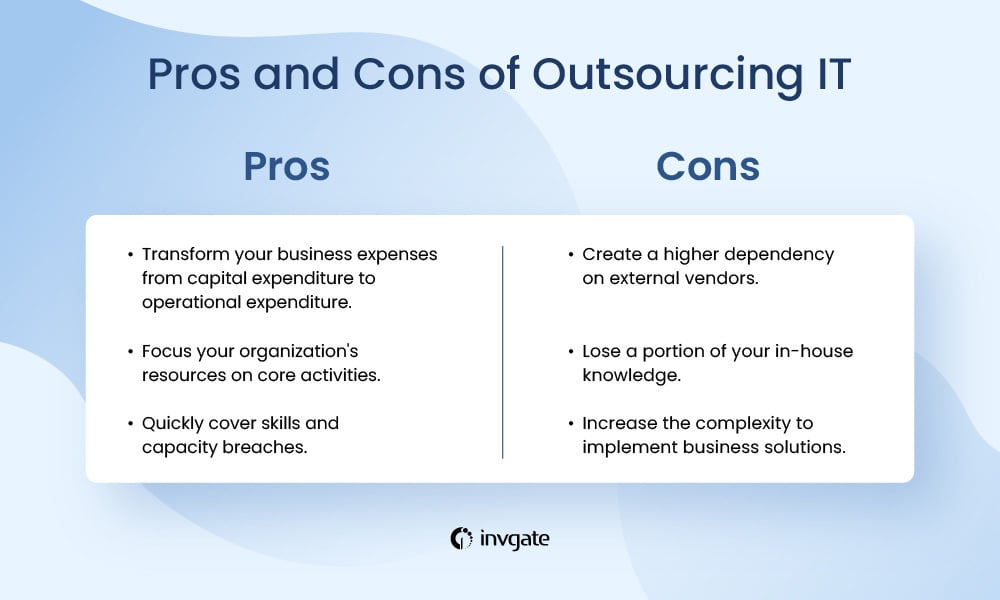Every IT manager faces that pivotal moment—whether it's budget season, planning for the future, or seeking smarter workflows—when the question arises: Should we outsource IT services?
It’s a significant decision, especially considering that 76% of businesses are already outsourcing some or all of their IT functions, according to a 2023 Deloitte report. This widespread adoption reflects how integral outsourcing has become to modern IT strategies, offering organizations flexibility, efficiency, and access to specialized skills.
But is it the right move for your organization? There's no universal answer. Outsourcing IT can streamline operations and fill skill gaps, but it also comes with challenges. In this article, we'll explore the pros, cons, and key scenarios where outsourcing IT could make sense. Let’s get started.

What does outsource IT mean?
Briefly, outsource IT refers to the practice of replacing internal technological capabilities with those provided by an external supplier. In essence, it involves delegating part or all of your IT department’s responsibilities to a third-party service provider.
This approach aligns closely with what is often referred to in the industry as "IT as a Service."
Outsourced IT support vs. in-house IT support
The key difference between outsourced IT support and in-house IT support lies in who manages and delivers the services. In-house IT support is managed internally by your organization’s employees, giving you direct control over operations, prioritization, and alignment with company culture. This approach allows for a deeper understanding of your business's unique needs but often requires significant investment in staffing, training, and infrastructure.
On the other hand, outsourced IT support relies on external providers to deliver services. This option offers scalability, cost-effectiveness, and access to a broader pool of expertise. However, it may present challenges in maintaining consistent communication and ensuring the provider fully understands your organization’s specific goals and processes. The choice between the two often depends on factors like budget, resources, and strategic priorities.

3 advantages of outsourced IT
Of course, there are certain advantages of an outsourced IT, as you can imagine, and we will summarize them in the following three points.
1. Transforming expenses from CapEx to OpEx
Outsourcing services makes it possible to transform costs that are typically capitalization expenses (CapEx) into operating expenses (OpEx). This will provide you with new opportunities when managing your budget, facilitating the adoption of new technologies, and speeding up the transformation.
A clear example of this advantage is the replacement of on-premise infrastructure – which requires the purchase of expensive equipment with usually long acquisition cycles – with a cloud infrastructure, which usually follows a pay-per-use model and is available almost instantaneously.
Managed services also exemplify this transformation by offering customizable and flexible IT solutions to meet specific business needs.

2. Focusing the organization's resources on core activities
Thanks to IT outsourcing, your organization will be able to focus its resources on core activities.
For example, your company could use the savings in money, time, and personnel to work on an ISO-9001 certification or on R&D related to the product it delivers to the market, something that will undoubtedly differentiate your offer from that of your competitors.
One thing is for sure: By leveraging an experienced team through outsourcing, you gain access to expertise and readiness that can further enhance your core activities.
In any case, we must not lose sight of the fact that, although the department and the services IT provides to the organization rarely differentiate an organization from its competitors, this does not mean that they are not important to the business.
Although the result the customer receives does not show whether the internal IT capabilities are in-house or outsourced, technology is what enables the effective delivery of the product or service. Therefore, it plays a fundamental role and can positively or negatively impact what is being sold.
To a large extent, we can then consider some of the IT services as a commodity, and as such, outsource them to reduce costs and redirect resources to the core areas of the business that generate competitive advantages in the market.
3. Filling skills and capabilities gaps quickly
Last but not least, outsourcing IT services will allow you to quickly fill the gaps that your company has in terms of skills and capabilities. For organizations that need flexible access to specialized expertise without full outsourcing, professional fractional IT services provide an ideal middle ground, offering on-demand access to senior-level IT professionals. Although selection processes are becoming more and more agile, talent in IT profiles is expensive and difficult to acquire.
On a day-to-day basis, this translates into difficulty in covering transitory work overloads and difficulty in acquiring highly skilled talent in new technologies. Desk support is an example of a service that can be outsourced to fill these skills gaps, much like customer service outsourcing, where standardized processes and external expertise are used to ensure consistent day-to-day support.
However, with IT outsourcing you will be able to access this talent dynamically and flexibly, allowing you to incorporate the knowledge and capacity you need to meet business needs temporarily, and release them when you no longer require them.

3 disadvantages of outsourced IT support
But since all that glitters is not gold, an outsourced IT has its cons, which we will also summarize in three points.
1. Creating greater dependence on external entities
Getting rid of the IT department (either in part or entirely) implies creating a dependency on one or more external providers. This will mean that, in turbulent times, you will not be able to manage the fine-tuning of the ship and you will be largely conditioned by the service contracts agreed with your suppliers and their ability to pass through them.
Likewise, you will expose the organization to completely unrelated risks, while internal supplier problems will have a direct impact on your service, without you being able to do anything about them.
2. Loss of some of the in-house knowledge
When you outsource, you lose in-house skills and capabilities. It makes sense if we consider that outsourcing involves a substitution, a replacement of an in-house capability. Therefore, the talent is no longer part of your organization.
While this may be trivial when we are talking about highly commoditized services, it becomes a complex situation when you outsource business-critical capabilities.
3. Increased complexity in implementing business solutions
This is perhaps the least considered and most important risk. The final disadvantage of outsourcing your IT service is that it will increase the difficulty of tailoring technology to the specific needs of your organization.
Technology services can indeed be seen as a commodity. However, technology applied to our business context rarely is. Therefore, you have to be aware that, by outsourcing the IT area, you lose part of the knowledge you have of the technology applied to your business.
In this sense, it is not common for suppliers to know the typical problems of their clients' operations, let alone the operational needs of each business. As a consequence, it is common that the operation is affected both in quality and innovation capacity due to a lack of understanding and holistic vision of the business.
When is it convenient to outsource IT support services?
The decision to outsource IT support services depends on balancing costs, risks, and the value added to your organization. While outsourcing can help you reduce internal risks and costs, it introduces new ones through external providers. Whether outsourcing creates value depends on how well these elements are aligned with your business goals.
There are many reasons to consider outsourcing IT, from improving scalability to optimizing costs. However, not all scenarios will benefit equally. For instance, outsourcing tasks like on-site support or printing services might have minimal impact, but it’s crucial to ensure the quality of the capabilities you gain matches or exceeds those you lose.
To help you assess the results and maintain service quality, a robust service desk solution can be invaluable. Tools like InvGate Service Management make it easier to monitor performance, enforce service level agreements, and evaluate the customer experience—all with minimal setup and training. In the following subtitles, we’ll explore three common scenarios where outsourcing IT support makes sense.
#1: When your organization needs scalability and flexibility
For small businesses or organizations looking for agile IT solutions, outsourcing can be transformative. Claire Agutter, a guest on Ticket Volume episode 32, shared her experience of outsourcing nearly every aspect of her organization's IT operations.
"We wanted to have that scalability and flexibility from day one."
Claire Agutter
Director of Scopism and ITSM Zone
Episode 32 of Ticket Volume
Agutter emphasized the importance of finding the right cultural and operational fit. Her team evaluated several vendors and ultimately chose one that prioritized flexibility and collaboration. The selected vendor allowed her organization to use fractional resources, maintain a 24/7 service desk, and empower staff with the autonomy to resolve minor issues without unnecessary escalations.
The result? A cost-effective and adaptable IT operation that wouldn’t have been possible with an in-house team. Agutter concluded that while outsourcing has challenges, much of its success comes down to picking a vendor whose values and approach align with your own.
#2: When cost optimization is a priority
Outsourcing IT can significantly reduce operational costs by eliminating the need for maintaining a full in-house team. Instead of investing in recruitment, training, salaries, and infrastructure, organizations can leverage the expertise of an external provider for a fraction of the cost. This approach is especially beneficial for small and medium-sized businesses (SMBs) that need enterprise-grade IT support but lack the resources to build it internally.
By outsourcing, you can turn fixed costs into variable ones, paying only for the services you use. Additionally, outsourcing providers often have access to the latest tools and technologies, which they can offer at no extra expense, saving your organization both time and money.
#3: When you require specialized expertise
The IT landscape evolves rapidly, and keeping up with emerging technologies and best practices can be daunting for in-house teams. Outsourcing allows you to tap into a pool of specialized experts who stay updated on the latest trends and solutions. Whether it’s implementing advanced cybersecurity measures, managing cloud migrations, or optimizing IT processes, external providers bring expertise that might not be available internally.
This access to niche skills can be a game-changer, particularly for short-term projects or initiatives requiring specific knowledge. Outsourcing ensures you get the right people for the job without the long-term commitment of hiring full-time staff.
Final thoughts on outsourcing IT
Outsourcing IT is not a one-size-fits-all solution. It requires balancing cost savings, service quality, and maintaining control over critical functions.
You can choose to outsource specific processes while keeping essential IT capabilities in-house. Using multiple vendors can foster competition, improve outcomes, and reduce dependency on a single provider. However, proper governance and oversight are essential to align outsourced services with business goals.
Remember, outsourcing decisions aren’t permanent. Stay flexible and revisit your strategy regularly to ensure it meets your organization’s evolving needs. With the right approach, outsourcing can enhance IT operations and drive long-term value.
Frequently Asked Questions
1. What services can be outsourced?
Much of IT can be outsourced, and there are even companies that outsource the entire department. This is very common in small organizations, where developing these capabilities is cost prohibitive. By outsourcing IT to a reputable services provider, they get a service of specialists and resources that would otherwise be inaccessible.
On the other hand, in medium and large companies, it is much more common to find IT departments with outsourced capabilities carefully chosen to optimize resources.
2. Will I lose control of the IT department if I outsource it?
When you decide to outsource IT, you necessarily give up some control, although the implications will depend on the risk/benefit ratio. Ideally, you should maintain enough control to ensure that IT objectives are aligned with the organization's objectives, without having to get into the micromanagement of designing how this should be done yourself.
3. How much money can I save by outsourcing IT?
The economic relationship will depend mainly on what you agree with your suppliers. Will you outsource only some services? Will you outsource the entire department? Or maybe you will only opt for this in a remote geographic region where moving your own staff is very complex?
The specific characteristics of what you outsource will make the savings marginal or extremely significant, but remember at all times: the important thing is to continue providing quality service. Reducing costs by affecting the quality of service is a solution for today and a problem for tomorrow.















